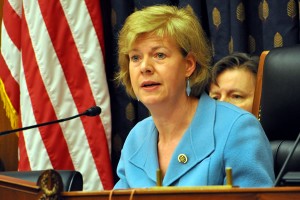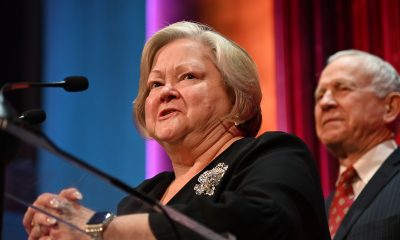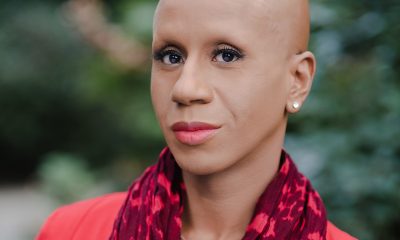National
U.S. commission considers ways to stop anti-gay Uganda bill
Greater involvement from first lady Michelle Obama was one option discussed during a recent congressional hearing as a way for the U.S. to help derail a harshly anti-gay bill in Uganda from becoming law.
Cary Alan Johnson, executive director of the International Gay & Lesbian Human Rights Commission, was among the people who testified before the Tom Lantos Human Rights Commission on Thursday that Obama’s work against the international HIV/AIDS epidemic would make her a strong voice against the bill.
Johnson said the women’s caucus in the Ugandan parliament is supporting the legislation and opposition from the first lady — as well as President Obama — could influence women’s groups in Uganda to drop their support.
“I’m wondering if there is women leaders within the U.S. Congress — and perhaps the first lady herself — might be able to play some role in having discussions about the potential impact of this bill — not just on human rights, but on HIV prevention within the country,” Johnson said.
Julius Kaggwa, a leader of the Civil Society Coalition on Human Rights & Constitutional Law who came from Uganda to testify on the legislation, also said greater involvement from President Obama and Michelle Obama would be helpful in efforts to stop the bill.
“If President Obama and the first lady of the United States can engage more with our first family — especially in the area of HIV/AIDS, which is of great concern to us as sexual minorities — and the issue of human rights generally, I think that would be very, very helpful,” he said.
A stronger voice from the first lady and President Obama was one among several options considered to stop the anti-gay legislation that’s been pending the Uganda parliament since October.
Homosexual acts are already illegal in Uganda, but the bill would, among other things, institute the death penalty for repeat offenders of the homosexual acts ban and for those who have homosexual sex while HIV positive. The harsh penalties for LGBT people in the legislation have inspired growing outrage and concern around the world, including LGBT activists in the U.S.
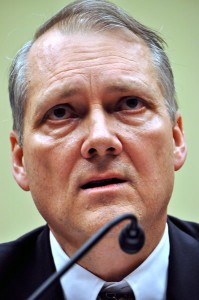
Karl Wycoff, deputy assistant secretary of state for East African Affairs (DC Agenda photo by Michael Key)
Karl Wycoff, deputy assistant secretary of state for East African Affairs, testified that the State Department has been working to prevent the bill from being enacted into law even as the U.S. considers the country an ally.
“The introduction of this anti-homosexuality bill in Uganda characterizes just such a moment — one where we must say to our friends who’s friendship we value that together we must stand against injustice, and in this case, injustice against the LGBT community,” he said.
Wycoff noted how the White House in January issued a statement in opposition to the legislation and said Secretary of State Hillary Clinton has expressed concerns about the bill with Ugandan President Yoweri Museveni in addition to publicly opposing the legislation in two speeches.
“Our embassy … has been very active on this subject with representatives of the Ugandan government, with civil society, with local gay and lesbian groups and with others who press for this bill to be dropped,” Wycoff said.
Last month, DC Agenda first reported State Department officials had received assurances from Museveni that he would work to block the legislation from becoming law and would veto the bill should it come to his desk. But during the hearing, Wycoff declined to characterize publicly the discussions the State Department had with the president.
Witnesses also discussed efforts of activists within Uganda working to prevent the bill from becoming law. Kaggwa said local groups have been trying to stop the measure, but noted that persuading lawmakers to oppose the bill is difficult because of the country’s deep cultural beliefs against homosexuality.
Kaggwa said one of the best points for opponents to bring up about the legislation is how it would require Ugandan citizens to report on those believed to be homosexual.
“The element of setting a mother against a daughter, the element of setting a sister against a brother, is something that we all can identify with,” Kaggwa said. “These are the arguments that we are using. We should make this bill really draconian, that instead of bringing together families, instead of preserving family, as purported by people who are pushing the bill, it’s [separating] families.”
Following the testimony, lesbian Rep. Tammy Baldwin (D-Wis.), who chaired the hearing, told reporters that bolstering the local effort in Uganda against the legislation would be one means for the United States to step up efforts against the bill.
“I do think it is important for us to listen and receive guidance from people on the ground in Uganda — not just thinking from afar what to do,” she said. “I think there’s probably additional ways where we can empower local activists, local voices in Uganda at the same time as we speak crystal clear our dedication to human rights for all [people] across the globe.”
Another option lawmakers are considering is revoking Uganda’s beneficiary trade status should the bill become law. Baldwin noted during the hearing that earlier this month, Sen. Ron Wyden (D-Ore.) sent a letter to Clinton saying Uganda’s trade relationship with the United States would be revoked if the country’s parliament enacts the legislation.
While a number of strategies were put forth as ways to prevent the legislation from becoming law, one option witnesses denied as being an appropriate response was restriction of funds under the President’s Emergency Plan for AIDS Relief. The program, also known as PEPFAR, is a multi-billion dollar initiative started by former President George W. Bush that provides treatment for people living with HIV/AIDS in developing countries.
Christine Lubinski, executive director of the HIV Medicine Association, said the $1.3 billion that the U.S. spends in aid to Uganda is “too much of a day-to-day lifeline for too many people.”
“It seems like there’s significant other avenues to pursue; the HIV money would not be good one,” she said.
But Johnson said there could be other avenues to pursue with AIDS relief money if Uganda passes the legislation. He said PEPFAR money could be “channeled differently” to non-governmental organizations that would implement HIV/AIDS relief programs in the country.
Another concern raised during the hearing was whether international efforts would have an adverse effect on stopping the anti-gay legislation because of the country’s history under colonial rule.
Wycoff said attention from the international community has actually contributed to some efforts in Uganda calling for the passage of the legislation.
“Ironically, foreign criticism of the bill has in some ways bolstered internal support for the legislation as many Ugandans interpret foreign condemnation as interference in their internal affairs,” he said.
But Kaggwa said international concern about the legislation is helpful, so long as local opposition against the bill is heard just as strongly.
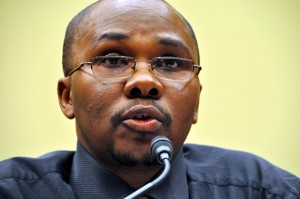
Julius Kaggwa, a leader of the Civil Society Coalition on Human Rights & Constitutional Law (DC Agenda photo by Michael Key)
“It is important that these local, indigenous voices are heard as heavily or as loudly as the international voices,” he said. “We believe that if that voice supplements our own voices, then we will be productive. But if the foreign voices are louder than ours, then I’m afraid that might have a counter-productive effect.”
Johnson said people opposed to the legislation are working to make sure both local and regional voices are heard against the bill, and that Obama could make the local voices stronger.
“I think that could be an aspect in which the administration could be more proactive in terms of talking to other African nations, and talking to the African Union, about making its voice heard on the legislation,” he said.
A number of Democratic U.S. House members spoke out against the bill during the hearing. Rep. Jim McGovern (D-Mass.), co-chairman of the commission, said the bill “is steeped in religious bigotry and homophobia.”
“I want to make it clear that there are many members in this Congress — both Democrat and Republican — who have deep, deep concerns about what’s happening in Uganda and are outraged by this draft legislation,” he said.
Baldwin called the legislation “an extreme and hateful attempt to make people criminals not because of anything they do, but because of who they are and who they love.”
She noted that 90 other U.S. House members joined her in signing a letter to presidents Obama and Museveni, requesting their strong opposition to the legislation.
“I hope that all Ugandans, and particularly those who are [LGBT], will hear the voice of this Congress state very clearly that we will not tolerate these types of human rights violations,” she said.
No Republican member of the commission attended the hearing. A Republican staffer for the commission didn’t immediately respond to DC Agenda’s request to comment on why GOP members were absent.
The White House
Jane Rigby awarded Presidential Medal of Freedom
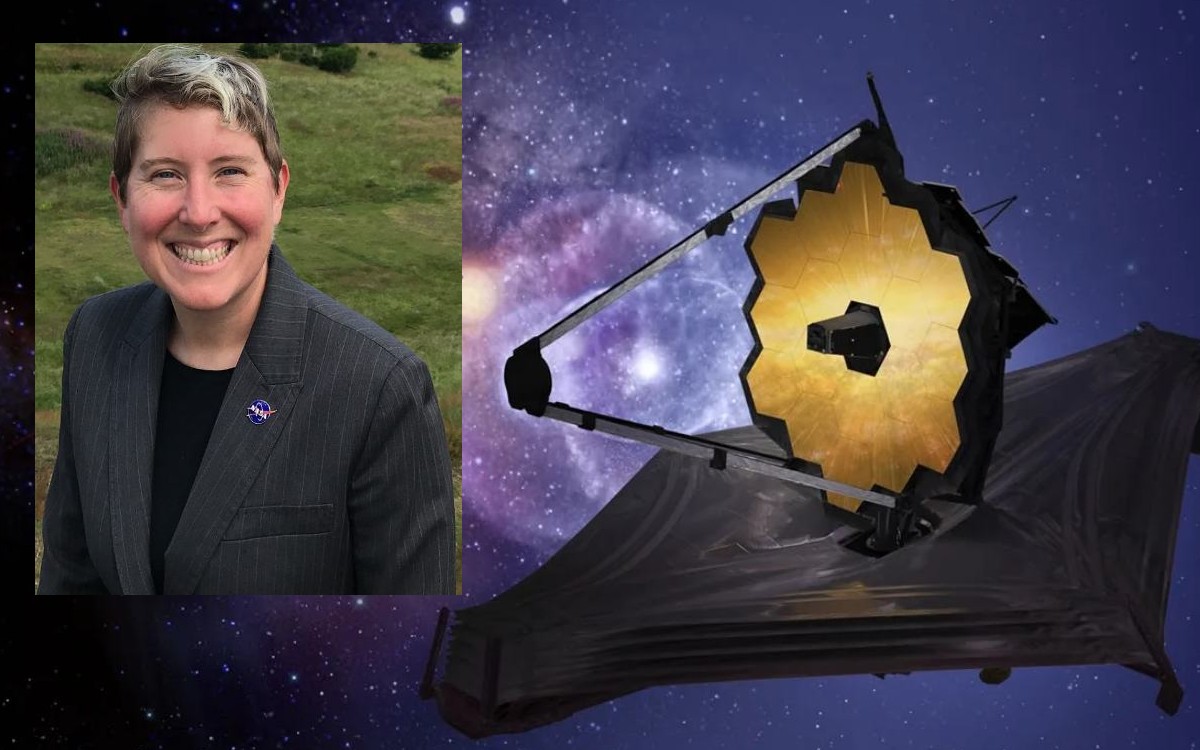
Sitting among a diverse and venerable group of Americans from every walk of life on the dais in the East Room of the White House on May 3 was lesbian and NASA astrophysicist Jane Rigby, awaiting her turn to be honored by President Joe Biden who would bestow the Presidential Medal of Freedom, the nation’s highest civilian honor, on her.
Rigby, an astronomer who grew up in Delaware, is the chief scientist of the world’s most powerful telescope who alongside her team operating NASA’s James Webb Space Telescope, studies every phase in the history of the universe, ranging from the first luminous glows after the Big Bang, to the formation of solar systems capable of supporting life on planets like Earth, to the evolution of the solar system.
A member of Penn State’s Class of 2000, Rigby graduated with a bachelor’s degrees in physics and astronomy. She also holds a master’s degree and a PhD in astronomy from at the University of Arizona. Her work as the senior project scientist for NASA’s Webb Telescope includes studies on how galaxies evolve over cosmic time and she has published more than 140 peer-reviewed scientific papers.
Rigby was named to Nature.com’s 2022 list of 10 individuals who shaped science and to the BBC’s list of 100 inspiring and influential women in the same year. Rigby had postdoctoral fellowships at Carnegie Observatories in Pasadena, Calif., before landing her job at Goddard Space Flight Center. In 2013 Rigby was awarded the Robert H. Goddard Award for Exceptional Achievement for Science.
A founding member of the American Astronomical Society’s Working Group on LGBTQ Equality in January 2012, now called the Committee for Sexual Orientation and Gender Minorities in Astronomy, Rigby serves as its Board Liaison until her term expires this June.
The lesbian astrophysicist in an interview for SGMA’s website spoke about her experiences including coming out:
“I’ve been out since 2000. My story’s simple — I fell in love with a fellow grad student in the department. It was a close-knit department, so hiding would have been ludicrous. Nor did I want to hide the best thing in my life! So, we were out as grad students. I certainly heard people say awful homophobic things at work there. They weren’t directed at me, and they weren’t said by people with power over me. If I recall, I was much less afraid of homophobic discrimination at work, than I was afraid of the two-body problem, and the lack of support we would receive as a same-sex couple in astronomy. That fear turned out to be justified. I’ve seen numerous different-sex couples get a wide range of support in solving the two-body problem, which was never offered to us,” she told the interviewer.
She reflected on American astronaut and physicist Sally Ride, her childhood role model who had an impact on her career:
“One of my biggest role models when I was young was Dr. Sally Ride. A few years ago, on her deathbed, Dr. Ride chose to write in her obituary that her life partner had been a woman. Dr. Ride was the most influential woman scientist when I was growing up — the person that made me say, “I want to do THAT when I grow up.” It was because of her that I realized that astrophysics was a profession, that physics was a subject girls could study, that NASA needed astrophysicists. So I’m so … amused, I suppose, that Sally Ride was this influence on my life’s path, at a time when I was completely unaware that it was even possible to *be gay* — and at the same time, she was gay, in love, and deeply closeted to keep her job.”
The interviewer noted that “for some women being gay is a cause for concern at the work place. Some say they were unsure about how to turn their sexual orientation into a positive aspect of their work persona.” Then asked Rigby what is your view on this?
“My experience is that absolutely I am a *better* astronomer because I’m queer. For a few reasons. First, I see things different than my colleagues. On mission work, as we weigh a decision, my first thought is always the community impact: ‘If we do things this way, who benefits, and who gets left out in the cold?’ Will this policy create inclusion, or marginalization? I think about science in terms of community-building. What team do we need to tackle a given science problem, with skills that are different from mine? Absolutely I think that way because I’m an outsider, because I’ve been marginalized. And because community-building is central to LGBTQ culture,” she said.
Editor’s note: You can read Rigby’s complete SGMA interview here: (Link)
Married to Dr. Andrea Leistra, Rigby, her wife and their young child reside in Maryland not far from her workplace at the NASA Goddard Space Flight Center in suburban Washington and when not studying the universe is often found on the neighboring Chesapeake Bay wind boarding, a favored pastime.
Also honored in the ceremony Friday were a former U.S. vice president, a civil rights worker and martyr, two former Cabinet secretaries — one a former U.S. secretary of state, a speech writer for the late Dr. Martin Luther King Jr., an Olympian and gold medalist, and one of the most powerful woman political leaders and the speaker emeritus of the U.S. House of Representatives, among others, and LGBTQ advocate Judy Shepard.
WATCH
Federal Government
US Census Bureau testing survey on LGBTQ households
Agency proposing questions about sexual orientation and gender identity

The U.S. Census Bureau is seeking public comment on a proposed test of sexual orientation and gender identity questions on the American Community Survey. The test would begin this summer and continue into next year.
The Census Bureau published the request as a Federal Register notice. In its press release the agency noted that the ACS is an ongoing survey that collects detailed housing and socioeconomic data. It allows the Census Bureau to provide timely and relevant housing and socioeconomic statistics, even for low levels of geography.
As part of the process for adding new questions to the ACS, the Census Bureau tests potential questions to evaluate the quality of the data collected.
The Census Bureau proposes testing questions about sexual orientation and gender identity to meet the needs of other federal agencies that have expressed interest in or have identified legal uses for the information, such as enforcing civil rights and equal employment measures.
The test would follow the protocols of the actual ACS — with one person asked to respond to the survey on behalf of the entire household. These particular questions are asked about people 15 years of age or older. Households are invited to respond to the survey online, by paper questionnaire or by phone.
The current Federal Register notice gives the public a final opportunity to provide feedback before the Census Bureau submits its recommendations to the Office of Management and Budget for approval. The public may provide feedback through May 30 online.
The White House
Judy Shepard to receive Presidential Medal of Freedom
Nancy Pelosi is also among this year’s honorees
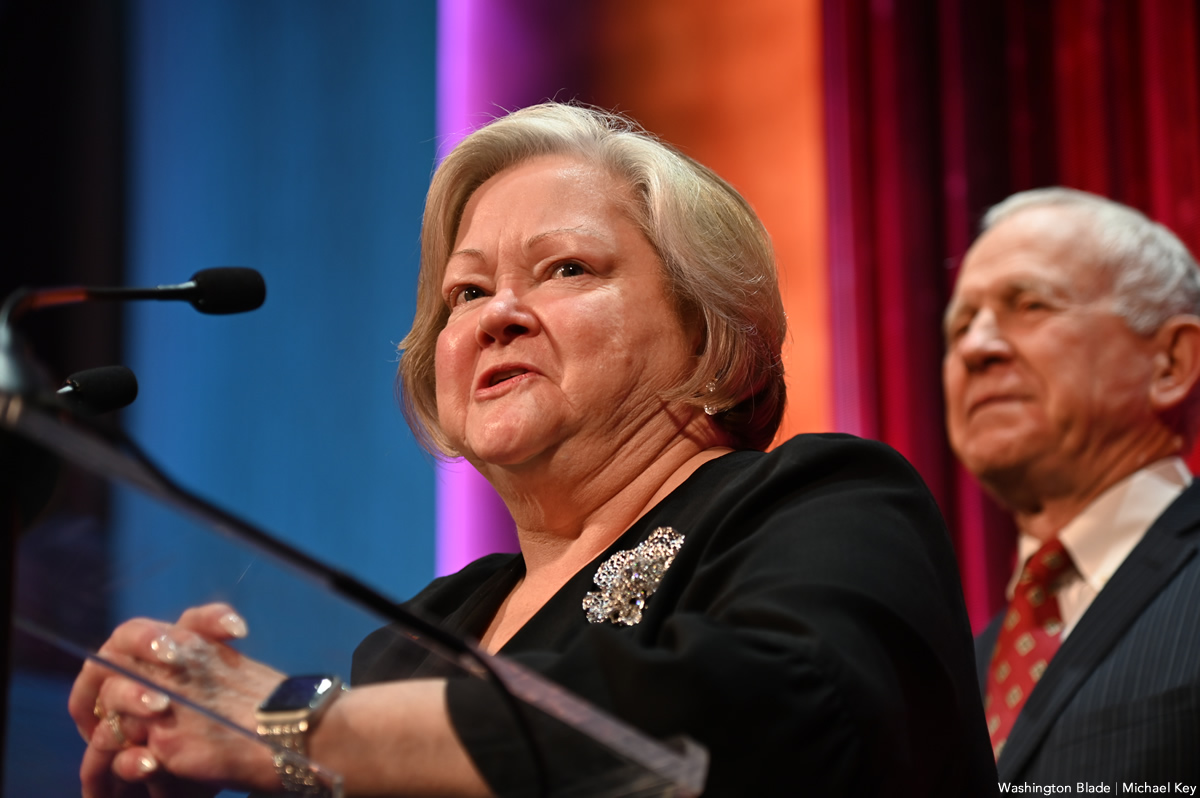
Beloved LGBTQ advocate Judy Shepard is among the 19 honorees who will receive the Presidential Medal of Freedom, the highest civilian award in the U.S., the White House announced on Friday.
The mother of Matthew Shepard, who was killed in 1998 in the country’s most notorious anti-gay hate crime, she co-founded the Matthew Shepard Foundation with her husband Dennis to raise awareness about anti-LGBTQ violence.
The organization runs education, outreach, and advocacy programs, many focused on schools.
In a statement shared via the Human Rights Campaign, Shepard said, “This unexpected honor has been very humbling for me, Dennis, and our family. What makes us proud is knowing our President and our nation share our lifelong commitment to making this world a safer, more loving, more respectful, and more peaceful place for everyone.
“I am grateful to everyone whose love and support for our work through the years has sustained me.
“If I had the power to change one thing, I can only dream of the example that Matt’s life and purpose would have shown, had he lived. This honor reminds the world that his life, and every life, is precious.”
Shepard was instrumental in working with then-President Barack Obama for passage of the landmark Matthew Shepard and James Byrd Jr. Hate Crimes Prevention Act in 2009, which was led in the House by then-Speaker Nancy Pelosi (D-Calif.), who will also be honored with a Presidential Medal of Freedom during the ceremony on Friday.
Also in 2009, Shepard published a memoir, “The Meaning of Matthew: My Son’s Murder in Laramie, and a World Transformed,” and was honored with the Black Tie Dinner Elizabeth Birch Equality Award.
“Judy Shepard has been a champion for equality and President Biden’s choice to honor her with the Presidential Medal of Freedom is a testament to what she’s done to be a force of good in the world,” HRC President Kelley Robinson said in a statement.
“A mother who turned unspeakable grief over the loss of her son into a decades-long fight against anti-LGBTQ+ hatred and violence, Judy continues to make a lasting impact in the lives of the LGBTQ+ community,” she said.
“It is because of her advocacy that the first federal hate crimes legislation became law and that countless life-saving trainings, resources and conversations about equality and acceptance are provided each year by the Matthew Shepard Foundation,” Robinson said. “We are honored that Judy is a member of the HRC family and know that her work to create a more inclusive and just world will only continue.”
Other awardees who will be honored by the White House this year are: Actor Michelle Yeoh, entrepreneur and former New York Mayor Michael Bloomberg, Jesuit Catholic priest Gregory Boyle, Assistant House Democratic Leader Jim Clyburn (D-S.C.), former Labor and Education Secretary and former U.S. Sen. Elizabeth Dole (R-N.C.), journalist and former daytime talkshow host Phil Donahue, World War II veteran and civil rights activist Medgar Evers (posthumous), former Vice President Al Gore, civil rights activist and lawyer Clarence B. Jones, former Secretary of State and U.S. Sen. John Kerry (D-Mass.), former U.S. Sen. Frank Lautenberg (D-N.J.) (posthumous), Olympic swimmer Katie Ledecky, educator and activist Opal Lee, astronaut and former director of NASA’s Johnson Space Center Ellen Ochoa, astronomer Jane Rigby, United Farm Workers President Teresa Romero, and Olympic athlete Jim Thorpe (posthumous).

